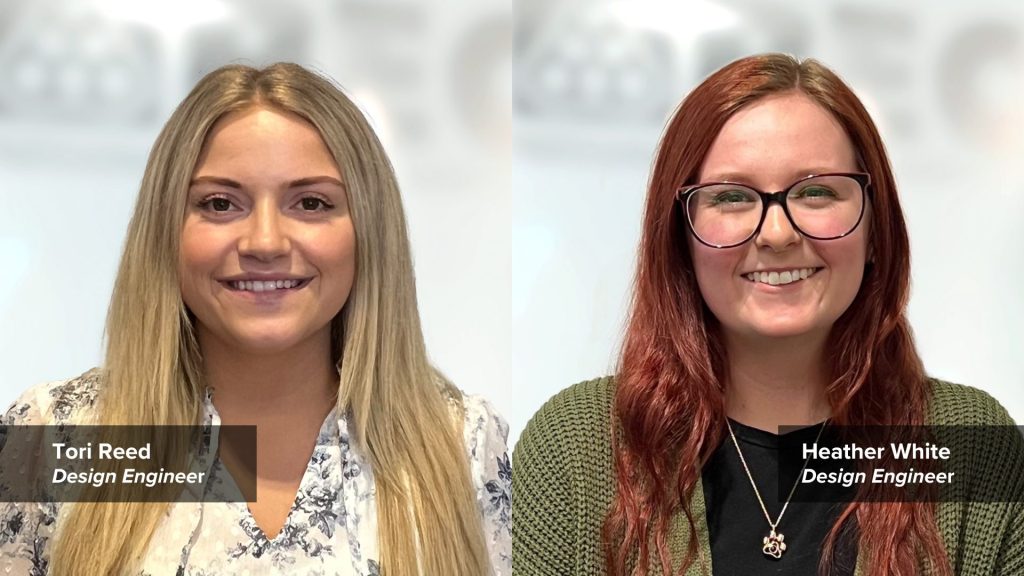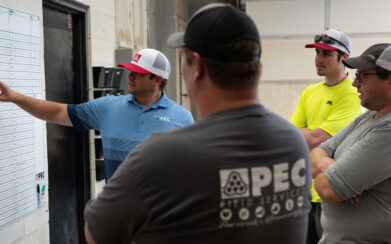Insights
Advocating for Cleaner Water with MS4 Permit Services
 PEC’s Tori Reed and Heather White from the Water Resources Team have been tackling Municipal Separate Storm Sewer System (MS4) Permits for our communities since 2023. Hear how their personal story drives them every day in the work that they do.
PEC’s Tori Reed and Heather White from the Water Resources Team have been tackling Municipal Separate Storm Sewer System (MS4) Permits for our communities since 2023. Hear how their personal story drives them every day in the work that they do.
PEC: Tell us about your backgrounds and how you came to work here.
Tori Reed (TR): I recently graduated with my master’s degree from Kansas State University in Biological and Agricultural Engineering. My thesis was dedicated to improving water quality and water bodies throughout Kansas. I started at PEC in May 2023 as a design engineer on the Water Resources team.
Heather White (HW): I also recently graduated with my master’s from Kansas State in Biological Engineering as well. During this program, I was a graduate research assistant and a teaching assistant. I’m also new at PEC, and a design engineer on the Water Resources team.
PEC: Of all the disciplines, what made you both pick water resources as a focus?
TR: We both have a similar background. For me, I grew up in southeast Kansas on a ranch, and I’ve always been passionate about being outdoors. When I was growing up, we went to the lake, camped, fished, and did water sports. Therefore, I’ve always been passionate about water quality. We always had water flooding problems where I grew up and water quality issues. My hometown still has a lot of water quality issues, so it’s always been important to me.
HW: Where I am from in southwest Kansas, we have the opposite issue; there is a lack of water. We hardly get any rainfall during the year and most of the agriculture is produced from pumping the Ogallala Aquifer. One of the biggest concerns facing that region of Kansas and surrounding states is the depletion of the aquifer. The concerns of my family’s farm are how I got interested in water, the preservation of water, and proper uses. We mostly assist smaller communities right now. It’s been our main thing and it’s very rewarding. We probably are drawn to them because we’re from small communities ourselves.
PEC: Well, that is incredible motivation for you both to work hard at what you do with the MS4 Permits. So, talk to us… what exactly is an MS4 Permit and what all is involved in it?
HW: In short, an MS4 Permit is a Municipal Separate Storm Sewer System Permit. This permit consists of six categories called minimum control measures. Some communities have an extra category if they have an impaired water body in their community. Within each minimum control measure, communities are required to implement best management practices that help protect and improve their local waters. These practices can consist of distributing education materials, hosting local cleanups of their parks, or having pet waste stations throughout their cities as well as more technical things like the adoption of standard operating procedures, stormwater manuals, and then managing runoff from construction sites. Essentially, an MS4 Permit provides an outline to help communities better protect their local streams, rivers, and lakes from pollution. For a lot of permits, you fill out one piece of paper. This is much more than that; they want you to have an entire program within your community dedicated to this permit.
PEC: Are these permits specific to Kansas?
TR: No, every state in the United States could have an MS4 permit. The EPA issues the permits, and they give them down to the state. For Kansas, we go through the KDHE, but Missouri has them and we’ve worked with the community in Missouri too.
PEC: How long has PEC offered the service? How did it take off?
TR: PEC has offered MS4 Permit support for almost a year. When I started, we had one client that needed support for their MS4 Permit. They were short staffed, so PEC has taken over their whole stormwater program. We do everything for them. That was our only client for MS4 for a while. About six months in I realized how much I enjoyed this work, and I was encouraged by everyone around PEC to pursue it full time. At that point, we started marketing and advertising this as a service at PEC. In a few months, we’ve added four or five clients and we have quite a few lined up as well. I feel so fortunate because I have been not only encouraged but supported to pursue this by so many people in so many different areas at PEC.
PEC: What do you feel is the biggest challenge with this permit and the programs you are both organizing for these cities?
TR: Small communities have been our focus up to this point, but the biggest challenge is the lack of staff time and resources. This permit is a huge job; there’s a decent responsibility when it comes to record keeping, documentation, and reporting. This permit also requires planning activities such as citywide cleanups or K-12 education. For this, you go into a school and teach a class on stormwater. We think it’s so fun!
There’s so much more that goes into it like writing those ordinances and researching everything that goes into them: writing legal language, pitching it to City Council, and city staff trainings on water quality and storm water; then, there’s collecting water samples. You have to collect it, get it to a lab within a certain amount of time, and then follow up on what you find. If that water sample is high in bacteria, you have a whole task for the week of figuring out where that bacterium is entering your water body. Another challenge that I’ve seen with so many of these small communities is just a lack of understanding when it comes to the requirements of the permit. There’s a lot of measurable goals that you must hit.
Another big challenge for us is that every community gets to choose what best management practices they’re going to do within the permit to stay in compliance. Every permit can look a little different; there’s not a cookie cutter approach to any community. It looks different every time, but also that’s kind of what we find fun about it too.
PEC: What is your favorite part of this role?
TR: Once I started working in the communities and hosting city staff trainings, my favorite part became the people in the communities we assist and how they show so much appreciation and gratitude for our support. It’s important to know that the work we’re doing is impactful and you don’t always get to see that sitting behind a computer screen every day. Engineering is a huge part of our job and while we are thankful for that part, it is really fulfilling to get out and help people in the communities. Heather and I have talked about how we have never met more grateful people. I love the people that I get to work with all the time. It’s awesome that I was passionate about water quality and education, and this permit marries those two things together perfectly.
HW: I completely agree and second everything Tori said. I really love the opportunity and ability to provide education and outreach to these different communities. I also really enjoy the opportunity to be creative and make things fun when learning about water quality and the importance of water in communities.
PEC: That’s great. How is your corner of the store serving our PEC mission of energizing communities, shaping the future, and guiding the way?
HW: This permit presents an opportunity for communities and community members to actively participate in their stormwater pollution prevention. This permit is unique because often stormwater management is a reactive approach, but this allows it to be proactive, which is really fun and engaging. This MS4 Permits energize communities by providing incentives for communities to host events such as their stream clean ups, park clean ups, and water quality education. Then, these programs help community members see their waterways as assets to their community as well. We’ve touched on this, but PEC has served communities by providing support for their permit, which has included water quality testing, data collecting, creating standard operating procedures, and then running these education events and booths. Recently, PEC developed educational materials for city staff training and industrial users that covered those six minimum control measures we previously mentioned. We believe that all of this directly helps serve the mission statement of PEC.
Learn more about MS4 Permit Services.









